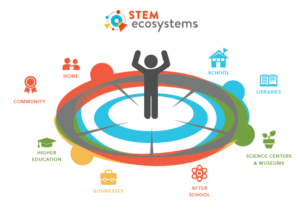Strategy One
Strategies
These four strategies were developed in consultation with a variety of practitioners across the country who are at the forefront of efforts to cultivate STEM Learning Ecosystems.
Cultivating Cross-Sector Partnerships
This first strategy is foundational—assessing gaps, identifying partners and determining collective goals creates a strong base from which to engage in creative approaches to the remaining three strategies that are based on each community’s needs, assets and interests.Robust cross-sector partnerships designed to create a collective vision of STEM success for young people are key to cultivating a rich STEM learning ecosystem.
To cultivate cross-sector partnerships, STEM Ecosystems can:
- Identify a credible, highly engaged lead organization committed to collaborative practice.
- Engage a broad range of stakeholders including:
- Schools/school districts
 Out-of-school time (OST) systems/ programs
Out-of-school time (OST) systems/ programs- STEM-expert museums and science centers
- Institutions of higher education
- STEM-focused companies
- Businesses that recognize the need for STEM competencies
- STEM professional organizations
- Libraries
- Community-based organizations
- Philanthropies
- Families and parent organizations
- Youth organizations and advisory groups
- Assess the community’s dynamics and readiness to engage in collaborative work.
- Define the current landscape, and identify priority gaps in access, quality and outcomes for young people’s STEM success.
- Develop an overall vision and goals.
- Define what each stakeholder will do to achieve those goals.
- Work on defining and using common language.
- Discuss and adopt shared measurements.
- Create and implement financing and policy strategies for scale and sustainability.
- Develop and implement a communications strategy.
- Plan specific approaches to continuous improvement. How will the use of data drive increased quality in all programmatic settings?
- Prioritize time for reflection and peer learning.

